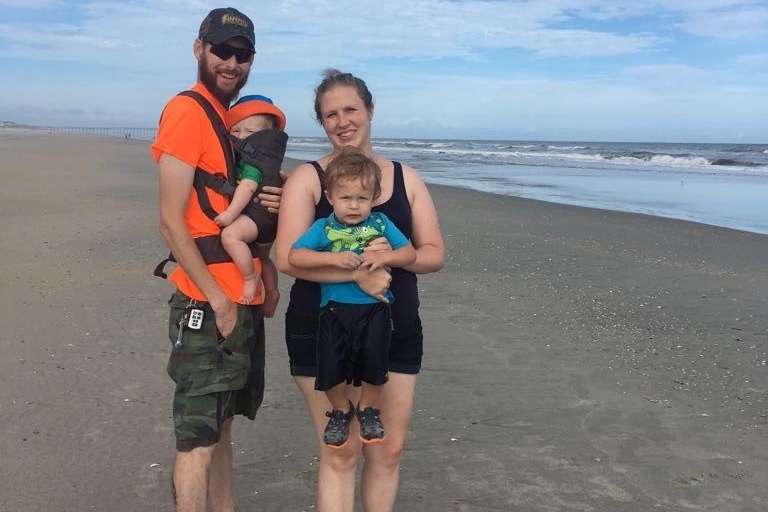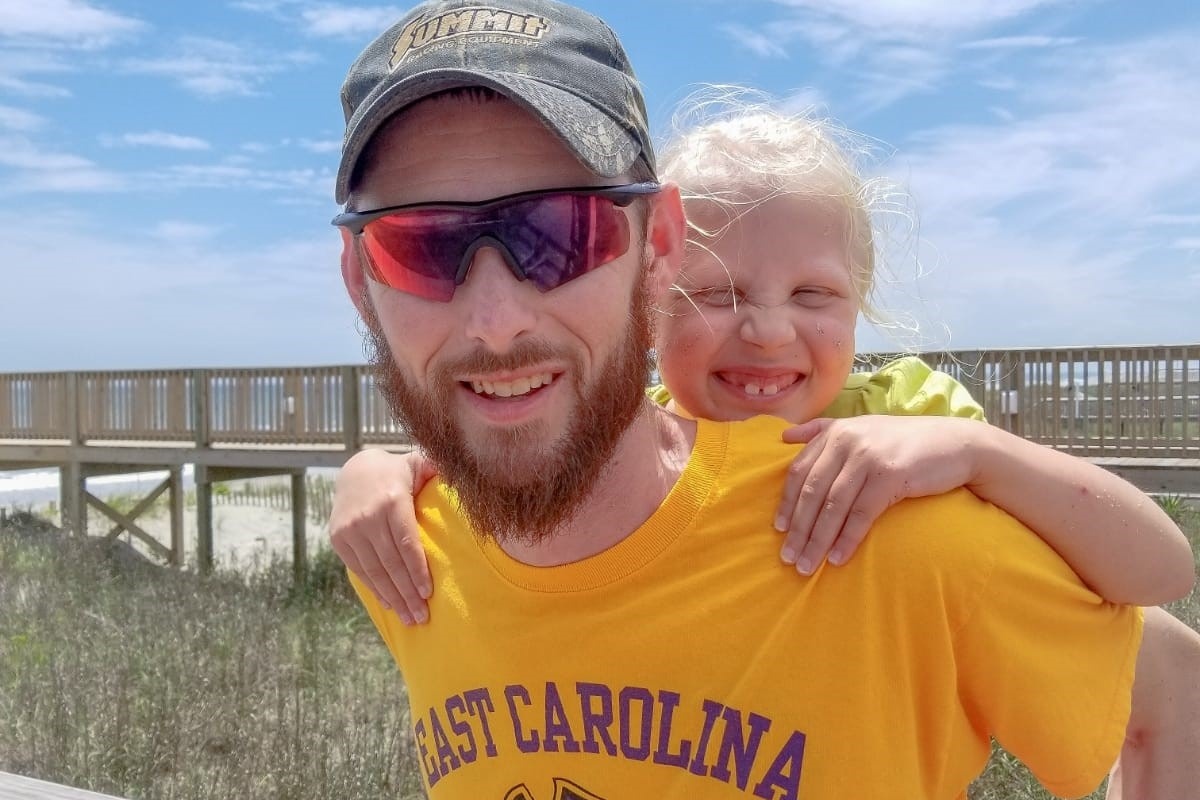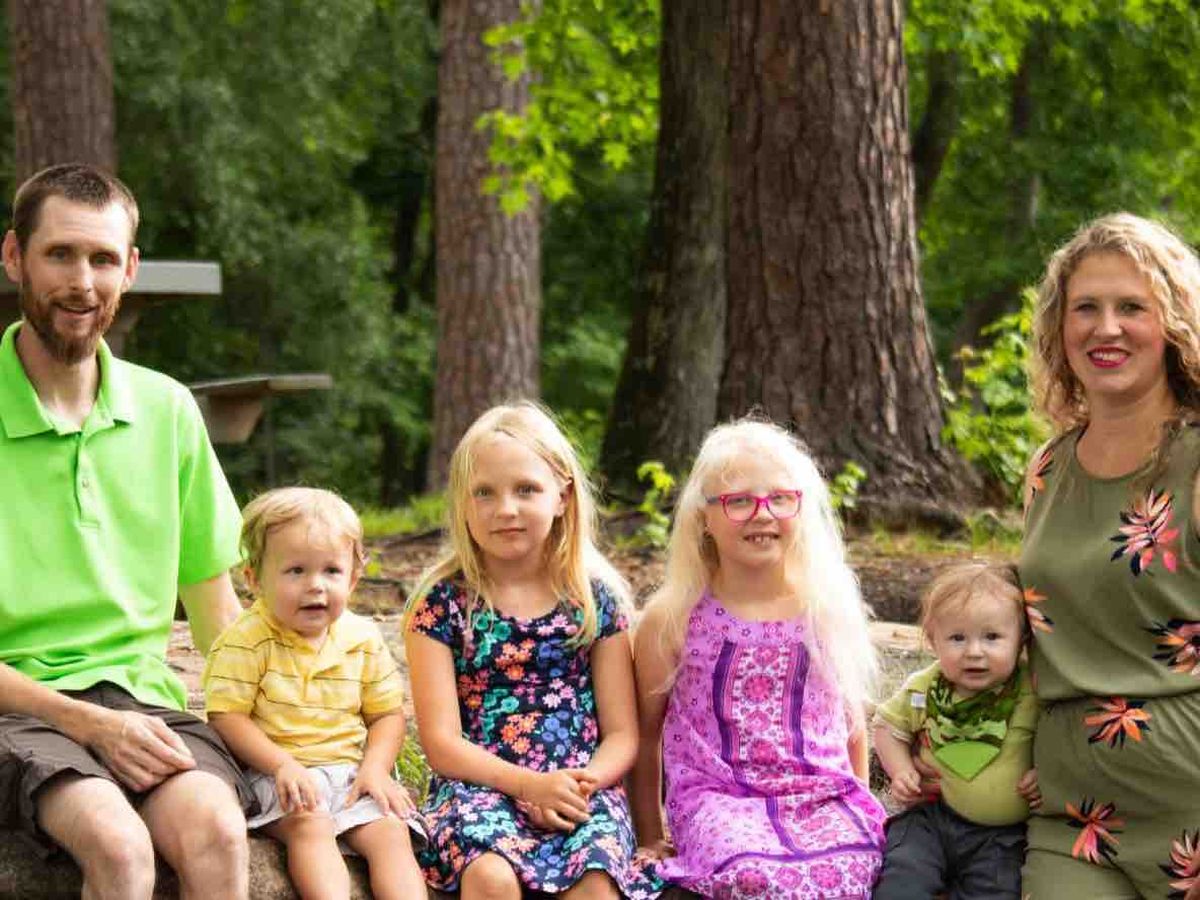 
 
 
 
 
 
 
 
 
 
 
 
 
 
 
 
 
 Doug Hayes is my son-in-law, Corinne’s husband and father to their children ages 12, 11, 5 and 4. Doug is working with the transplant teams at both Cleveland Clinic (Cleveland, OH) and MedStar Georgetown University Hospital (Washington, DC) while waiting for a multi-visceral organ transplant (pancreas, liver, stomach, small and large intestines), Here is Doug's story:
Doug Hayes is my son-in-law, Corinne’s husband and father to their children ages 12, 11, 5 and 4. Doug is working with the transplant teams at both Cleveland Clinic (Cleveland, OH) and MedStar Georgetown University Hospital (Washington, DC) while waiting for a multi-visceral organ transplant (pancreas, liver, stomach, small and large intestines), Here is Doug's story: 

In 1988, Doug was a 4-year-old boy playing on the playground when he tripped over another boy. When he fell, he couldn't catch his breath so he was taken to the emergency room in Roanoke Rapids, NC. There they discovered a mass in his abdomen. Unsure of what it was, they transferred him to Greenville, NC. He was diagnosed with pancreatic cancer (pancreatoblastoma). He was only the 3rd diagnosed case in the U.S. and treatment was experimental. He required surgery, chemotherapy and radiation. The surgery removed 85% of his pancreas, 50% of his stomach, 50% of his small intestine and 60% of his colon. As a result, he requires daily medicine to aid in proper digestion.
In 1989, he was officially in remission.
In 1996, while attending a Boy Scout service event, he experienced his first GI bleed at 12 years old. (He became an Eagle Scout a few years later.) That is when they found that the portal vein in his liver was blocked due to scarring from the radiation treatments years earlier. He was stabilized in Greenville, then he was referred to Boston Children's. In the summer of 1997, his portal vein was replaced in Boston. It closed right away, so they cleaned it out the following day. It closed again, so they determined it had failed. With no ideas of what to do next, they left it as it was.
In 2000, Doug had another GI bleed. He was treated in Greenville, where they banded his gastric varices (veins that aren't supposed to be there, and are the source of his GI bleeds). Then sent him back to Boston afterward where they decided to do major microvascular reconstruction surgery to try to give his blood supply somewhere else to go.
In 2001 Doug was 18, old enough to go to his first doctor's appointment by himself. At that appointment, he was diagnosed with post trauma diabetes (more closely related to Type 1 & insulin dependent) and he was directly admitted to the hospital to get it under control.
In 2005, Doug moved to Nashville, TN, to pursue an education in Automotive Diesel Mechanics. He bled on the first day, requiring a short hospitalization.
2011 - Doug experienced perhaps the worst GI bleed. He was taken to Rex Hospital in Raleigh and transferred to UNC Hospital in Chapel Hill, NC. They made several attempts to stop his bleeding by placing "coils" in the veins. As they monitored, he continued to bleed—and then coded. They successfully gave him blood straight into his jugular vein, and fortunately they were finally able to stop the bleeding. He had so much blood loss during this stay that several outpatient transfusions were required after his release.
In 2014 Doug and Corinne were married in Raleigh, NC, and along with her daughters they became a family of 4.
In 2015, Doug had back-to-back GI bleeds with only days between admissions. There were 4 hospitalizations in a 1-month period. The first 2 were at WakeMed Hospital in Raleigh. Following a procedure to place more coils, the doctors determined their facility was not equipped to handle such a complex anatomy. They discharged him with instructions to go to UNC Hospital in Chapel Hill with any future issues. The following 2 stays were at UNC. They placed several more coils this time. They also started him on blood pressure medication, hoping that would reduce the pressure caused by his blocked portal vein.
In 2016, they became a family of 5 with the birth of their first son. This was quite a miracle, because Doug had been told years earlier that he probably would not be able to father a child, to live a normal life, or even survive the treatment path of surgery, radiation and chemotherapy that was ahead of him. 

In February 2017, the family arrived home from a trip to the grocery store and put the kids in bed. Doug started bleeding once again. He was admitted at UNC Hospital and in an attempt to stop the bleeding, they placed more coils. In addition, they stopped the blood flow to his spleen (eventually killing it) in hopes that would help reduce the pressure from his blocked portal vein. They also realized during that time that they couldn't keep "plugging the holes" so they started talking about a 3-organ transplant (liver, pancreas, small bowel).
Doug and Corinne talked to the UNC transplant team in March 2017, where they were informed that UNC was not equipped for a transplant as complicated as his. They referred him to MedStar Georgetown University Hospital in Washington, DC. Doug scheduled a workup in Georgetown for June. 

However, in May 2017, he again had multiple bleeds with 3 hospitalizations. After being discharged from the 2nd hospitalization, he was discharged and given permission to join his family on a previously planned beach vacation on the NC coast. As they arrived in time for dinner, Doug was bleeding slightly. By the following afternoon, he was bleeding severely and was taken by ambulance to New Hanover Regional Hospital. From there, he was Life-Flighted by helicopter back to UNC Hospital. A few days later, while Corinne and the kids were in his hospital room for a quick visit, he suddenly bled and lost consciousness in front of them. A Rapid Response team was required to bring him back.  

Later that week, UNC Hospital decided there was nothing more they could do for him, and he was flown via a private medically-equipped jet to Medstar Georgetown. While there, they did the transplant workup and expanded his transplant to include the stomach and large intestine. He was told he may need the transplant right away and he must stay in DC. They partnered with the Interventional Radiology team and placed a modified TIPPS (shunt near portal vein and a stent in a vein that had been closed 20 years). The surgery was successful and he was able to come home to NC in June. He had been hospitalized for 5 weeks and lost more than 20 pounds. Shortly after returning home, he was officially listed for transplant.
In August 2017, Doug returned to Georgetown to see how his TIPPS was holding up and to sclerose (kill off) some of the excess veins that had been bleeding earlier in the summer. His TIPPS had closed, requiring an angioplasty to open it.
In September, they welcomed their youngest son and became a family of 6.  

In February 2018, Doug went to Medstar Georgetown for follow up and learned his TIPPS had closed again, requiring another angioplasty. His doctor decided that he could not wait 6 months between procedures, and scheduled him to return in June.
April 2018, he bled again and was admitted to UNC Hospital. Thankfully, his body was able to stop the bleeding with only IV medications this time. Upon discharge, his transplant team requested Doug and Corinne come to Washington that week for a visit.
Early in May, Doug's family celebrated as he officially became the father of their 2 oldest daughters. It was a happy day when they were notified the adoptions had finally been approved. 

At this visit in DC in May, his doctor told Doug that he was a "ticking time bomb," the reality was that the TIPPS was not a cure or forever fix, and someday (maybe any day) he is going to bleed and they will not be able to stop it.
From 2018 to 2021, Doug travelled to Georgetown every 12 weeks for additional TIPPS procedures.
In 2021, Cleveland Clinic’s transplant team accepted Doug into their program in Ohio. His family relocated from N Carolina to Ohio in August.
In November, he had a TIPPS procedure done at Cleveland. His team noted these procedures were becoming progressively less effective. By December, they proposed a very new, rare & risky shunt surgery that, if successful, could mean big improvements for Doug’s health. They suggested Doug consider it over the next few weeks.
January 2022, Doug suddenly became extremely disoriented as he experienced signs of liver failure. This required an emergency admission and 11-day stay at Cleveland Clinic. Two of three major veins to his liver had closed and disappeared. The remaining vein is enlarged and receiving all the pressure previously distributed through three veins. This also causes a build up of dangerous toxins. Since there is no way to correct his liver’s blood flow, the only thing that can be done is to minimize the toxins with medication and a strict vegetarian diet.
Since this new liver problem developed, the shunt surgery is no longer a possibility. Transplant is his ONLY hope.
According to his doctors, Doug realistically may not survive surgery. About 16-20 of these transplants are done annually nationwide. There is a 40% survival rate after the first year.
Doug is aware of the risks, but he chooses to fight the greater fight. The transplant journey is a difficult one. Doug's illness has already required many hospitalizations, requiring him to spend weeks away from his family.
Through all of these challenges, Doug looks forward to his transplant and just living, being a dad, raising his kids with his wife, and enjoying what each day brings!
The average multi-visceral transplant costs almost $2 million. AND THAT'S ONLY THE BEGINNING. Even with health insurance, which will cover the cost of the transplant itself, he faces significant expenses related to the surgery. For the rest of his life, he will need follow-up care and daily anti-rejection medications. Post-transplant medications are very expensive, and they're as critical to his survival as the transplant itself. Doug will receive five organs, and the recovery will be lengthy.
Miracles do happen...Doug and his family are already proof of this many times over. If you can help with this next miracle, I'm certain you will be doubly blessed.
Please share, and pray for them! All of your generous assistance is greatly appreciated.
Link to the Facebook group Doug’s Transplant Journey:
https://m.facebook.com/groups/197824837362718


